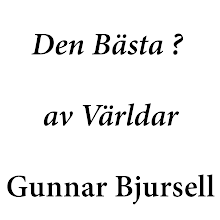 Svenska (English below):
Svenska (English below):'Blodsbunden' av Flannery O'Connor kan betecknas som ett synnerligen mörkt verk med absurdismen och tragikomiken som bärande inslag.
Flannery O'Connor föddes 1925 i Savannah i södra USA och dog 1964 i Baldwin County, Georgia. Hennes föräldrar var både troende katoliker, något som påverkade hennes författarskap eftersom hon ofta i sina verk kom att beröra olika religiösa frågeställningar. Detta inte minst i nedanstående verk.
Boken handlar om ett antal individer av mer eller mindre (oftast kanske mindre) moraliskt tvivelaktig karaktär.
Fr.a. får vi följa en man vid namn Hazel Motes som efter avslutad militärtjänstgöring återvänder till den amerikanska heta Södern och staden Taulkinham som är en helt fiktiv stad med självklara förebilder bland de samhällen i vilka O'Connor växte upp.
Motes möter då han återkommer till Taulkinham människor som är eller upplevs vara lika socialt anpassade som han själv.
Andra figurer som passerar revy är Enoch Emery som arbetar vid stadens djurpark trots att han föraktar djur. Omgivningen tycks dock förakta honom lika mycket som han föraktar 'sina' djur.
Vi finner också den blinde predikanten Asa Hawks som alltid åtföljs av sin dotter Sabbath Lilly Hawks.
Kontakten med denna predikant och många andra människor huvudpersonen Motes finner vara antingen bigotta eller överdrivet sekulära i sin världsuppfattning, leder honom till att grunda en egen kyrka; 'Kyrkan Utan Kristus'.
Detta är enligt honom den kyrka ”där de blinda inte ser, där de lama inte går och där det som är dött förblir dött”.
Samtidigt som man här kan tolka in en kritik mot den 'falska' kristendom eller tro som han fann är boken också kritik av den moderna sekulariseringen av kyrkan, ett parodierande av den existentiella filosofin och idéen om att det bortom den omedelbara och uppfattbara situation i vilken vi lever och verkar inget annat finns.
Inget 'hinsides'.
I denna bok tycks varken hopp eller tröst finnas för de enskilda individerna i ett samhälle präglat av fattigdom, ignorans och uppgivenhet.

Detta är enligt honom den kyrka ”där de blinda inte ser, där de lama inte går och där det som är dött förblir dött”.
Samtidigt som man här kan tolka in en kritik mot den 'falska' kristendom eller tro som han fann är boken också kritik av den moderna sekulariseringen av kyrkan, ett parodierande av den existentiella filosofin och idéen om att det bortom den omedelbara och uppfattbara situation i vilken vi lever och verkar inget annat finns.
Inget 'hinsides'.
I denna bok tycks varken hopp eller tröst finnas för de enskilda individerna i ett samhälle präglat av fattigdom, ignorans och uppgivenhet.

English:
Flannery O'Connor written the book 'Wise Blood' (1952) and it's a book that can be described as a extremely dark account of a community in the South of USA.
The absurd and tragicomic elements in the book differential feature in this book.
Flannery O'Connor was born 1925 in Savannah in the southern parts of USA and she died in Baldwin County, Georgia in 1964.
Her parents where catholic believers, something that came to inluence her writing as she often dealed with issues concerning faith, 'unfaith', secular beliefs and religious questions on the whole.
The main character in this book is Hazel Motes who after finishing his military service return to the fictitious town of Taulkinham in the southern parts of USA, a community with clear references to small towns that could have served as a model for this one.
In this town he meet people that are or are perceived as socially maladjusted. This is something they share with Motes. One of the characters we meet is Enoch Emery who works in the local zoo despite despising and hating animals.
Another character is the blind preacher Asa Hawks always accompanied by his daughter Sabbath Lilly Hawks.
Motes relation with Hawk, the preacher and all the other people he feels being either bigoted or to secular in their conception of the world, leads him to start his own church; 'The Church without Christ', where "the blind don't see, where the paralysed don't walk and what is dead stays dead" (my translation from Swedish).
We can on the same time interpret this as a criticism against the 'false' Christianity where the confession of the lips are prevalent, as well as a criticism against the outmost secular form of thinking where everything that exists is those things we can see and touch and besides this there is nothing.
Neither can we, according to this thinking, expect anything after death.
The book is as well a criticism against the secularism of the church and also, as stated above, a parody of the existential philosophy.
It does not seem to exist any hope or consolation for the poor, dejected and ignorant people in this book.
Flannery O'Connor written the book 'Wise Blood' (1952) and it's a book that can be described as a extremely dark account of a community in the South of USA.
The absurd and tragicomic elements in the book differential feature in this book.
Flannery O'Connor was born 1925 in Savannah in the southern parts of USA and she died in Baldwin County, Georgia in 1964.
Her parents where catholic believers, something that came to inluence her writing as she often dealed with issues concerning faith, 'unfaith', secular beliefs and religious questions on the whole.
The main character in this book is Hazel Motes who after finishing his military service return to the fictitious town of Taulkinham in the southern parts of USA, a community with clear references to small towns that could have served as a model for this one.
In this town he meet people that are or are perceived as socially maladjusted. This is something they share with Motes. One of the characters we meet is Enoch Emery who works in the local zoo despite despising and hating animals.
Another character is the blind preacher Asa Hawks always accompanied by his daughter Sabbath Lilly Hawks.
Motes relation with Hawk, the preacher and all the other people he feels being either bigoted or to secular in their conception of the world, leads him to start his own church; 'The Church without Christ', where "the blind don't see, where the paralysed don't walk and what is dead stays dead" (my translation from Swedish).
We can on the same time interpret this as a criticism against the 'false' Christianity where the confession of the lips are prevalent, as well as a criticism against the outmost secular form of thinking where everything that exists is those things we can see and touch and besides this there is nothing.
Neither can we, according to this thinking, expect anything after death.
The book is as well a criticism against the secularism of the church and also, as stated above, a parody of the existential philosophy.
It does not seem to exist any hope or consolation for the poor, dejected and ignorant people in this book.

(Photo Flannery O'connor taken from: http://upload.wikimedia.org/wikipedia/en/9/9c/FlanneryO%27Connor.jpg)
(Picture cover 'Wise Blood' taken from: http://my52books.com/wp-content/uploads/2011/10/presents9.jpg)
(Photo Flannery O'Connor with self protrait taken from: http://spurgeon.files.wordpress.com/2010/03/flannery-oconnor-self-portrait.jpg)














